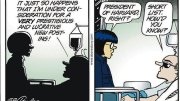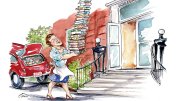Wright Brothers’ Reach. Beyond their obvious eminence, those who receive Harvard honorary degrees don’t appear to have much in common. Intriguingly, Primus has received nifty historical detective work on one connected set of honorands from John D. Bullock, M.D. ’68, M.P.H. ’03, and H. Bradford Hawley, M.D., emeritus professors and infectious disease experts at Wright State University School of Medicine, in Dayton, Ohio—home to Wilbur and Orville Wright, LL.D. ’30, of aviation fame.
Wilbur, they write, was bound for Yale until suffering a serious injury while playing pond hockey as a high school senior. In the aftermath, he developed severe depression and dropped out of high school to retreat to the family home, where he cared for the boys’ mother. He and younger brother, Orville (another dropout!), formed the Wright Cycle Company in 1892. This business provided the funding and time they needed for their pursuit of aviation, culminating in Orville’s piloting of the first successful flight with a powered airplane near Kitty Hawk, North Carolina, on December 17, 1903.
Like modern entrepreneurs, the Wrights became embroiled in multiple patent lawsuits as a result of their invention. In preparation for a portion of this litigation, Wilbur visited Boston in late April 1912 to meet with their patent attorney, Frederick P. Fish, A.B 1875, LL.B. ’77, LL.D. 1930. There, Wilbur reportedly ate seafood in his hotel’s restaurant. Returning to Dayton, he became febrile, and on May 2 was diagnosed with typhoid fever. He was subsequently seen by the famous Cincinnati physician, Dr. Frederick Forchheimer, S.D. 1912. Orville sat devotedly at his bedside. On May 30, Wilbur died at the age of 45 at the family home.
Curiously, these three individuals who interacted with Wilbur in the last few weeks of life later received Crimson honorary degrees.
Forchheimer, a Columbia-trained M.D., spent two years studying in Europe before returning to practice in Cincinnati, where he wrote a textbook on internal medicine and cofounded a prestigious medical organization with the famous academic physician, Sir William Osler. Weeks after caring for Wilbur, he received an honorary Doctor of Science degree.
Fish, admitted to the bar in 1878, later formed the firm Fish and Neave. He served as president of AT&T from 1901 to 1907; was offered, but declined, the MIT presidency; returned to patent lawyering; and later served on Radcliffe’s governing board and as an Overseer. On May 4, 1912, Wilbur’s last known letter was written to Fish; for many years, his firm used an image of the Wrights’ original plane on their literature (and, later, on their website). On June 19, 1930, his alma mater conferred an honorary Doctor of Laws on Fish.
Also honored that day was Orville Wright. Of his youth, he later wrote, “We were lucky enough to grow up in an environment where there was always much encouragement to children to pursue intellectual interests; to investigate whatever aroused curiosity.” After quitting school, he started several local newspapers, including The Tattler (for Dayton’s African American community), which was edited by his friend, classmate, and future famous poet, Paul Laurence Dunbar. Harvard recognized this pioneer of flight with an honorary Doctor of Laws degree.
Thus, in the last month of his life, three future Harvard honorands from totally different professions all intersected with Wilbur. Had the typhoid bacillus not infected him, he too might have been invited to Cambridge to receive his own degree. The good doctor-historians Bullock and Hawley have now honored him and his circle posthumously.

Dark Horse? Garry Trudeau, an Eli, now creates original Doonesbury strips only for the Sunday comics, but recycled editions appear in newspapers’ daily rotation. In the February 8 edition, Honey offers her sort-of husband, the drug-addled Uncle Duke, consolations over his feckless presidential campaign. Brushing her off, Duke retorts that he’s in the running for “a very prestigious and lucrative new posting!” Honey responds, “President of Harvard, right?” Duke confirms, “Short list. How’d you know?” It is uncertain whether Yale, searching for the successor to Peter Salovey, feels short-circuited.









